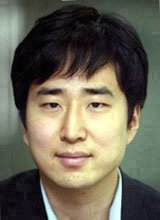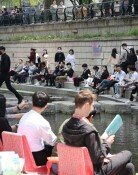Emily has none of Muslim friends
Emily has none of Muslim friends
Posted November. 13, 2020 07:40,
Updated November. 13, 2020 07:40

Netflix’s “Emily in Paris” has taken the world by storm since it was released last month. The popular comedy-drama ranks high in the number of views across various countries including France and South Korea. The Netflix-produced rom-com focuses on Emily, a young woman in her 20s from Chicago, experiencing cultural differences and love life in Paris. A high popularity of the series has led the French tourism development agency, to promote in-city places that are described in its episode.
“Emily in Paris” has received as much criticism as popularity. French daily newspaper Le Parisian and British broadcaster BBC wrote in a sarcastic tone, saying that the capital of France in the drama, where cliché is wildly rampant, is filled solely with love and romance while all the French people are illustrated as arrogant or graceful. Even French friends of mine opine that such a high degree of unrealism only makes it look
One of the most frequently asked questions on French streets is why the rom-com depicts Paris as a city exclusive to Caucasians. Indeed, it has only two non-Caucasian characters – a black man who is one of Emily’s coworkers and her bestie who is of Chinese descent. In the drama, Paris’ streets, parks and restaurants seem to be occupied mostly by white people. Second- and third- generation immigrants, born on French soil, who practice Islam are unpleased by the narrative of the series, saying that many Muslims living in Paris are whitewashed and that Westerners’ biased and discriminative viewpoints are reflected in a raw way. According to data in 2019, as high as nine percent of the French population of 67 million is Muslim. A merely quick stroll around Paris tells you that non-Caucasian citizens often outnumber their white counterparts in quite some places.
Some may think that it is ridiculous overreaction to a fictional story. However, given that France and other European regions have recently suffered growing social tension, such criticism may make some sense. Over the last month, a series of terrorist acts has occurred across.
Mr. Mehdi, a French Muslim, said in an interview, “All the Muslims are not terrorists but people in the subway give me a terrified look.” Julia, a Caucasian woman, argued that all the Muslims are not terrorists but most terrorists are Muslim.
The European Union decided to meet up on Friday to revise the Schengen Agreement, which guarantees free travel across member states, so as to tighten border control and impose restrictions on immigrants who refuse to integrate into European society. Meanwhile, anti-French and anti-European sentiment is ever increasing across many Islamic countries. Global affairs experts give a clichéd reply, saying, “As the clash of civilizations dates back to the Middle Ages where Christians and Muslims fought against each other, there is no silver bullet.”
Nevertheless, it is a relief that there is growing social consensus that the worst-case scenario should not become a reality. Michelle, a citizen in her 40s chanted in an anti-terrorism protest in Paris, “Conflicts only give a reason and cause to the ISIS and other extremist groups. We should end rage.” “We may be able to reduce risks of terrorism by putting ourselves into others’ shoes, which we should deem as easygoing and relaxing as watching an episode in the sofa after work, rather than by racking our brains to come up with a grand social integration policy,” said an undergraduate named Jean Pierre.
All of this may explain why many Parisians share their opinions on social media hoping that “Emily in Paris Season 2” will portray characters of diverse races just as Paris in the real world represents. Hopefully, a chain of small changes will lead us to the shortcut to an upside-down revolution.
Youn-Jong Kim zozo@donga.com







